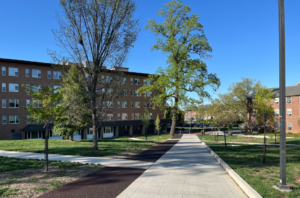College Republicans Host Students for Carbon Dividends

Courtesy of Students for Carbon Dividends Facebook Page
By Theresa Whitfield
Wednesday night in Caldwell Auditorium College Republicans hosted the president of Students for Carbon Dividends, Alexander Posner, to speak on the conservative proposed solution to climate change, a looming issue which has come to define our generation. By traveling around the country and sharing its ideas, this group is changing the public’s perception of the Republican views on climate change.
There were approximately fifty people in the audience, which was mainly comprised of members from College Republicans, but members of College Democrats and the Environmental Club were also in attendance, as well as interested students and faculty members.
Holly Thompson, a sophomore environmental studies major and the president of the Environmental Club, is very passionate about the issue of climate change and was highly interested in what Posner had to say.
“I really care about finding solutions for climate change, whether it’s Democrat or Republican,” Thompson said. “I am definitely more Democrat, but it is important to hear everyone’s solutions.”
Students for Carbon Dividends launched in 2018, a year after the Baker-Schultz Carbon Dividend Plan was first proposed. Named after James Baker and George Shultz, arguably the two most influential Republicans in the United States according to Posner, this plan has quickly become “the breakthrough free market climate solution,” stated Posner.
Typically, when one considers the issue of climate change, as Posner remarked, mental images of polar bears and penguins on melting ice are conjured. Instead of speaking on the issues affecting animals and their ecosystems, Posner reframed the topic to focus on the human consequences of climate change. Of the various threats climate change poses to humans, one of the biggest human consequences is the threat it poses to the military. In the past, the Department of Defense has spoken about climate as a threat to national security. Posner argued that the threat to humans is the biggest factor that will unite everyone to work for a solution.
As it stands, climate change is a “risk management problem” with an 11 percent chance of actualizing with irreversible consequences. That number may seem low, but as Posner stated, “Would you get on an airplane with an 11 percent chance of crashing?”
The most popular solution to climate change currently circulating in the media is the Green New Deal. However, as Posner said, this deal is “one part green and ten parts new deal.” He stated how this deal, drafts of which have reached thousands of pages long, would involve spending trillions of dollars on a big government solution filled with subsidies. On the other hand, the Baker-Shultz Dividends Plan, drafts of which have reached sixty pages at the most, is economically feasible, limits government power, and completely eliminates all subsidies.
The plan can be broken into four parts, each building off of the previous one. The first proposed step is to implement a carbon tax. A carbon pollution fee is the free market solution simply because “if your pollution harms others, you ought to pay for it,” according to Posner.
While praising capitalism, Posner also remarked how it is prone to bugs, and one of them is the fact that the government or innocent third parties usually end up paying the hidden cost of CO₂ emissions. If the cost of carbon is calculated into the market instead of subsidized, the market will become more accurate. Essentially, all economists agree that a carbon tax is the most obvious solution.
Similarly, in the 1990’s, under the administration of George H.W. Bush, the issue of acid rain was virtually eliminated once a tax on sulphur was implemented. Furthermore, a tax on carbon emissions will incentivize innovation.
A question that arises with the proposed carbon tax is what the government will do with all the money from it. As a solution, all of this tax money will be taken and returned to the American people through what is known as “carbon dividends.” Carbon dividends are concrete benefits people will have with the implementation of this plan. Eventually, the tax and carbon dividends will essentially slash all EPA regulations concerning carbon. This specific aspect of the plan is highly appealing to businesses such as Shell, General Motors, BP, and ExxonMobil, who have all signed on to the Climate Leadership Council Supporting the deal.
Finally, this plan will cause a “Climate Domino Effect,” according to Posner. There will be a level playing field for all countries, something that the Trump administration did not believe existed in the Paris Accords. Any country that adopts this plan will grant favorable benefits to its citizens, and other countries will recognize this and implement it for their own benefits.
Last spring, College Democrats hosted a discussion on climate change during which the same deal was proposed. With attention on this issue of climate change having increased tenfold in the past two years, this solution has quickly gained momentum alongside the Green New Deal. This solution will likely be introduced into both chambers of Congress later this year.
Posner ended his talk by calling on the need for GOP leadership to face this issue. He stated that there needs to be a return to tradition of environmental victories under Republican leadership.
“We will have a climate solution,” he said, “but what will it look like?”








